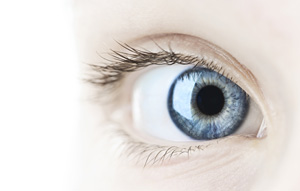Large Pupils
 Are Large Pupils Normal?
Are Large Pupils Normal?
If your eyes have large pupils but you have no vision problems, it is probably a normal condition for you. The size of the eye's pupils can vary from one individual to another, in which case the definition of what constitutes large pupils is somewhat subjective. If others think you have large pupils it probably means that theirs are smaller than yours, but beyond that may mean little.
|
|
Mydriasis Is The Name - Large pupils, a condition known as mydriasis, can be a problem if your eyes allow too much light to the point where your vision is affected, or you may be experiencing degrees of discomfort. This is an abnormal condition of course, and would best be treated by an ophthalmologist. In the course of a day, our pupils will constantly be changing in size. They will grow larger (dilate) when we step from the sunlight into the shadows or enter a dark room. The opposite of course happens when we go from a dark area into one where the light is much brighter.
This is of course normal behavior. Also, our pupils tend to become smaller in size as we age, which is one reason why the elderly may at some point start having difficulty in driving at night, as their pupils do not dilate sufficiently to bring in sufficient light to allow them to see images clearly. This also is normal.
|
|
You may have experienced a case of very large pupils during a visit to the optometrist. As an aid in examining the interior of your eye, the optometrist (or ophthalmologist) dilates the pupil with an agent known as a mydratic. The ophthalmic medication of choice is normally cyclomydril. Its effects will usually last an hour or so and, while you can see relatively normally, you'll usually be given a throw away pair of sunglasses if you are going outside.
Some Things Best Avoided - There are a number of agents other than the one mentioned, which will cause the pupils to dilate, sometimes when you don't particularly want them to. Ingesting certain drugs will induce mydriasis. A number of the psychedelic drugs including various mushrooms, mescaline, and LSD will trigger the brain into causing the pupils to enlarge. Cocaine will do the same. In fact if cocaine is applied directly to the eye as cyclomydril is applied by the ophthalmologist, large pupils will result. Opiates such as morphine and heroin have an opposite effect on the pupils in that the pupils contract, a condition known as miosis. Withdrawing from these opiates however often results in mydriasis and the pupils become abnormally large. Certain medical conditions in which the nervous system is affected can also cause large pupils, although when this occurs it is usually temporary. An epileptic seizure, a stroke, or any number of other nervous system disorders can cause temporary dilation of one or both pupils.
Everyday Causes of Mydriasis - It isn't just bad things that can cause a case of large pupils. There are a number of medications which contain compounds which can affect the muscles of the eyes or the receptors in the brain, causing pupils to either enlarge or contract. A vitamin deficiency, especially a B vitamin, has been known to cause large pupils. And, in everyday life there's those instances of sexual arousal which can make our pupils dilate. Whether this is to allow more light in so we can better see the object that attracts us, or whether our pupils are enlarging in an effort to make us more attractive (large pupils tend to do that) isn't clear. But there is a definite correlation between pupil size and sex, a temporary situation to be sure.
Regardless as to whether you have large pupils, small pupils, or normal pupils, both should be the same size. At least this is the case for the vast majority of people. If one pupil is noticeably larger than the other, an eye examination is advisable as this is definitely not a normal condition.